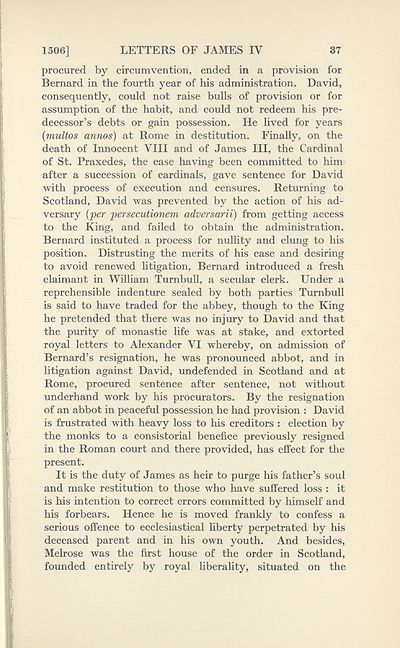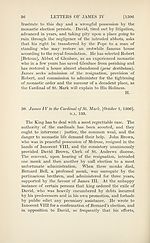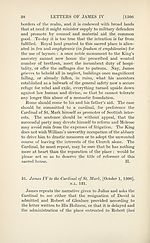Series 3 > Letters of James the Fourth, 1505-1513
(116) Page 37
Download files
Complete book:
Individual page:
Thumbnail gallery: Grid view | List view

LETTERS OF JAMES IV
37
1506]
procured by circumvention, ended in a provision for
Bernard in the fourth year of his administration. David,
consequently, could not raise bulls of provision or for
assumption of the habit, and could not redeem his pre¬
decessor’s debts or gain possession. He lived for years
(multos annos) at Rome in destitution. Finally, on the
death of Innocent VIII and of James III, the Cardinal
of St. Praxedes, the case having been committed to him
after a succession of cardinals, gave sentence for David
with process of execution and censures. Returning to
Scotland, David was prevented by the action of his ad¬
versary {per persecutionem adversarii) from getting access
to the King, and failed to obtain the administration.
Bernard instituted a process for nullity and clung to his
position. Distrusting the merits of his case and desiring
to avoid renewed litigation, Bernard introduced a fresh
claimant in William Turnbull, a secular clerk. Under a
reprehensible indenture sealed by both parties Turnbull
is said to have traded for the abbey, though to the King
he pretended that there was no injury to David and that
the purity of monastic life was at stake, and extorted
royal letters to Alexander VI whereby, on admission of
Bernard’s resignation, he was pronounced abbot, and in
litigation against David, undefended in Scotland and at
Rome, procured sentence after sentence, not without
underhand work by his procurators. By the resignation
of an abbot in peaceful possession he had provision : David
is frustrated with heavy loss to his creditors : election by
the monks to a consistorial benefice previously resigned
in the Roman court and there provided, has effect for the
present.
It is the duty of James as heir to purge his father’s soul
and make restitution to those who have suffered loss : it
is his intention to correct errors committed by himself and
his forbears. Hence he is moved frankly to confess a
serious offence to ecclesiastical liberty perpetrated by his
deceased parent and in his own youth. And besides,
Melrose was the first house of the order in Scotland,
founded entirely by royal liberality, situated on the
37
1506]
procured by circumvention, ended in a provision for
Bernard in the fourth year of his administration. David,
consequently, could not raise bulls of provision or for
assumption of the habit, and could not redeem his pre¬
decessor’s debts or gain possession. He lived for years
(multos annos) at Rome in destitution. Finally, on the
death of Innocent VIII and of James III, the Cardinal
of St. Praxedes, the case having been committed to him
after a succession of cardinals, gave sentence for David
with process of execution and censures. Returning to
Scotland, David was prevented by the action of his ad¬
versary {per persecutionem adversarii) from getting access
to the King, and failed to obtain the administration.
Bernard instituted a process for nullity and clung to his
position. Distrusting the merits of his case and desiring
to avoid renewed litigation, Bernard introduced a fresh
claimant in William Turnbull, a secular clerk. Under a
reprehensible indenture sealed by both parties Turnbull
is said to have traded for the abbey, though to the King
he pretended that there was no injury to David and that
the purity of monastic life was at stake, and extorted
royal letters to Alexander VI whereby, on admission of
Bernard’s resignation, he was pronounced abbot, and in
litigation against David, undefended in Scotland and at
Rome, procured sentence after sentence, not without
underhand work by his procurators. By the resignation
of an abbot in peaceful possession he had provision : David
is frustrated with heavy loss to his creditors : election by
the monks to a consistorial benefice previously resigned
in the Roman court and there provided, has effect for the
present.
It is the duty of James as heir to purge his father’s soul
and make restitution to those who have suffered loss : it
is his intention to correct errors committed by himself and
his forbears. Hence he is moved frankly to confess a
serious offence to ecclesiastical liberty perpetrated by his
deceased parent and in his own youth. And besides,
Melrose was the first house of the order in Scotland,
founded entirely by royal liberality, situated on the
Set display mode to:
![]() Universal Viewer |
Universal Viewer | ![]() Mirador |
Large image | Transcription
Mirador |
Large image | Transcription
Images and transcriptions on this page, including medium image downloads, may be used under the Creative Commons Attribution 4.0 International Licence unless otherwise stated. ![]()
| Scottish History Society volumes > Series 3 > Letters of James the Fourth, 1505-1513 > (116) Page 37 |
|---|
| Permanent URL | https://digital.nls.uk/126697983 |
|---|
| Attribution and copyright: |
|
|---|
| Description | Over 180 volumes, published by the Scottish History Society, containing original sources on Scotland's history and people. With a wide range of subjects, the books collectively cover all periods from the 12th to 20th centuries, and reflect changing trends in Scottish history. Sources are accompanied by scholarly interpretation, references and bibliographies. Volumes are usually published annually, and more digitised volumes will be added as they become available. |
|---|


